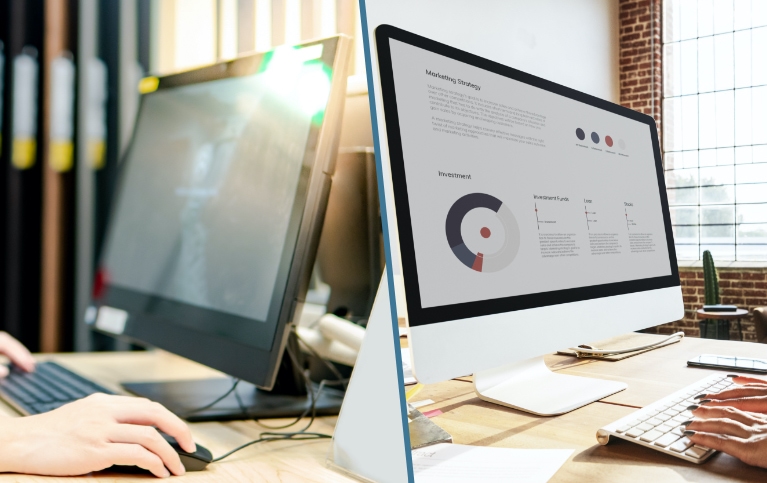There are few debates that divide groups of people in Chicago, Tampa, and the wider United States more than the PC-versus-Mac debate. It’s an important argument to be had, too, especially if you’re running a small business. That’s because if you invest in the wrong computers, your business could lose thousands of dollars on devices that hinder your team’s productivity and efficiency.
To help you make an informed decision, we’ve assessed PCs and Macs against five key criteria.
Ease of use
When it comes to the user experience, Macs have an edge over PCs thanks to their intuitive interface and simplistic design. Developers are constantly improving Mac OS layouts and adding quality-of-life upgrades so everyone, from creatives to business professionals, can work smoothly right out the gate.
Despite the Mac’s clean layouts, other employees may prefer the style of PCs. In fact, Windows operating systems account for 75.94% of the US market share, while Macs make up only 16.71%. That means more people will be familiar with the Windows interface and can therefore get up and running faster with little training time compared to Macs. Windows 10 PCs may even be on par with Macs because of their universal search bar, built-in virtual assistant, and logically structured menus.
Ultimately, it all boils down to what your company is comfortable with. If your company has relied on Macs and Apple software for over a decade, it doesn’t make sense to suddenly switch your entire operation to Windows systems. Getting your team’s opinion and preferences on both operating systems is imperative in choosing the right devices.
Software compatibility and functionality
Windows PCs are popular across different industries, which means many modern software, including productivity apps, automation tools, and data analytics programs, are optimized for PCs. Plus, Windows PCs are integrated with the Microsoft ecosystem, so your company can seamlessly incorporate cloud solutions like Microsoft 365 and Teams to your processes.
Meanwhile, Macs don’t have access to the same expansive software library as PCs. They have exclusive software like Automator and FileVault, but Apple’s closed ecosystem leaves relatively limited choices for businesses. Where Macs shine is in the creative professional space. Many artists tend to favor Macs because of their feature-rich, yet intuitive selection of creative tools like Final Cut Pro. However, you can also circumvent compatibility issues by running Boot Camp or virtual machines on your Mac. These utility tools emulate Windows computers on a Mac device, allowing you to run applications that would otherwise be unavailable for Macs.
Security
Although no computer is impervious to cyberthreats, Macs have historically been targeted much less than PCs. One reason for this is that official enterprise programs are thoroughly vetted before they’re distributed through the App Store to protect users from nefarious apps. Another reason is PCs are more popular among businesses, so they tend to draw unwanted attention from cybercriminals. Since there are plenty of applications that run on Microsoft, system vulnerabilities are much more common in PCs.
Macs and Windows machines run on different frameworks, with Mac being based on UNIX and Windows being based on DOS. UNIX is a more security-oriented framework due to a variety of built-in defense measures, which lends to the Mac being a more secure platform than Windows.
However, just because Macs are less vulnerable to attacks, it doesn’t mean businesses can afford to be complacent with security. Both Macs and PCs come with security features that are constantly updated, but this needs to be supplemented with enterprise-grade firewalls, threat prevention systems, and backups.
Customizability
A key advantage of PCs is that they give your company the flexibility to pick and choose the hardware components powering your devices. You can customize PCs down to their processors, memory, storage drives, sound system, graphics cards, input/output board, and displays, so your team can work with a device that suits their needs. This also enables your team to quickly upgrade your system when it needs more RAM or storage space, allowing you to prolong your computer’s life and keep devices updated without breaking the bank.
On the other hand, Mac devices have very little room for upgrades and customization. Certain Mac devices even solder SSD storage and other hardware components on the motherboard, making them impossible to upgrade. In such cases, the only option is to pay for a completely new device when your hardware resource requirements have outgrown your current Macs.
Cost
The size of your company’s budget will determine whether you should purchase a Mac or PC. One of the biggest issues with Macs is that they tend to be priced higher than their competitors. A MacBook Air, which is one of the cheaper options, costs around $999 dollars, while an iMac can set you back upwards of $1,100. Of course, your company will have to pay even more if workers need powerful hardware to run resource-intensive programs like video editing and data analytics software.
Another issue is that Apple is the only manufacturer of Mac products, so hardware components and configurations are limited. If a MacBook’s battery breaks, you’ll have to shell out at least $130 dollars for a replacement when the device is past its warranty. All of these costs quickly add up for small businesses, but the good news is that Macs generally last for 7-10 years while PCs last for only 3-5 years and need to be replaced often. Therefore, Macs make for a great long-term investment if you have consistent computing needs for years to come.
In contrast, Windows PCs accommodate different price points and hardware requirements. There are budget laptops that go for as low as $400, and premium desktop PCs boasting high-end hardware with costs exceeding upwards of $6,000.
What’s more, unlike Macs, you have plenty of options on the make and model of your PC beyond those offered by Microsoft. Leading manufacturers like Acer, Dell, Lenovo, HP, and Asus also provide a plethora of devices with customizable hardware components. There are also different form factors for PCs such as portable ultrabooks, 2-in-1 tablet and laptop hybrids, or powerful desktop workstations. Even maintenance costs for PCs come out cheaper than Macs since replacement parts are widely available and there are many Microsoft-certified service providers all over the US.
Macs and PCs both provide distinct business benefits, so it’s important that you understand your company’s computing needs first before making a decision. If you need professional IT consultants for an objective opinion on what your company should invest in, call Dynamics Solutions Group today. We support both Mac and PC, allowing us to give you impartial advice on investing in the right hardware.






